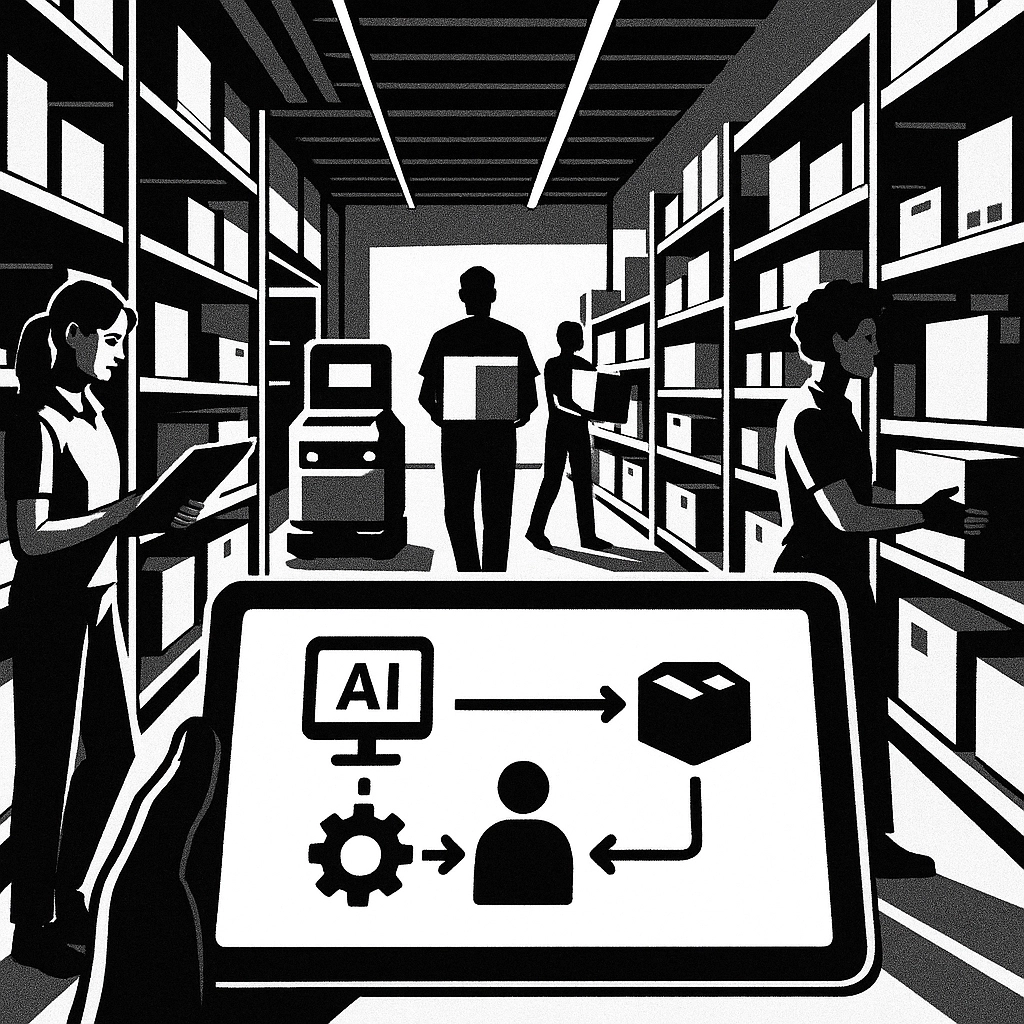Call us now:
The AI Revolution Is No Longer Just for Big Players
Remember when artificial intelligence seemed like something only tech giants and Fortune 500 companies could afford? Those days are firmly behind us. In 2025, AI has become the not-so-secret weapon that's leveling the playing field for small and medium-sized businesses across every industry.
The numbers tell a compelling story: 77% of small businesses now use AI in at least one business function, with adoption rates climbing each quarter. But what's really interesting isn't just how many businesses are using AI—it's how dramatically it's changing their outcomes.
As a business coach working with SMBs every day at The SMB Solution, I've witnessed firsthand how the right AI implementation can transform struggling operations into streamlined, profitable ventures. Let's dive into why AI might be the competitive edge your business needs in 2025.
Why AI Matters More Than Ever for Small Businesses
The business landscape has fundamentally changed over the past few years. Customer expectations have soared, competition has intensified, and economic pressures have forced businesses to do more with less. In this environment, AI offers solutions that were previously unimaginable:
1. Hyper-Personalization at Scale
Today's customers expect personalized experiences. The challenge? Delivering personalization to hundreds or thousands of customers simultaneously.
AI bridges this gap by analyzing customer data to create individualized experiences without requiring an army of staff. From email marketing that adjusts based on recipient behavior to product recommendations that evolve with customer preferences, AI enables small businesses to deliver big-business personalization.
Case in point: A local bookstore in Portland implemented an AI recommendation engine that tracks purchase history and browsing behavior. The result? A 42% increase in repeat purchases and a 28% jump in average order value—all without adding a single employee.
2. Automation That Actually Works

The first wave of business automation was clunky and limited. Today's AI-powered automation is something else entirely.
Modern AI tools can handle complex tasks that previously required human judgment:
- Scheduling appointments and managing calendar conflicts
- Generating comprehensive financial reports and forecasts
- Creating marketing content (everything from social media posts to blog articles)
- Answering customer inquiries with contextual understanding
The data backs this up: 89% of small businesses now leverage AI to automate repetitive tasks, freeing up human talent for more creative and strategic work.
3. Predictive Business Intelligence
Perhaps the most powerful aspect of AI is its ability to forecast trends and outcomes based on data analysis that would be impossible for humans to process manually.
Small businesses are using AI to:
- Predict inventory needs before shortages occur
- Identify customers at risk of churning before they leave
- Spot market trends before competitors can react
- Optimize pricing strategies based on demand patterns
As one client told me recently, "It's like having a crystal ball, except it actually works."
The Four Pillars of AI Success for Small Businesses
Based on our work with hundreds of small businesses implementing AI solutions, we've identified four key areas where AI delivers the most immediate impact:
Customer Experience Enhancement
AI-powered customer service tools have matured dramatically. Today's solutions go far beyond basic chatbots:
- Conversational AI that handles complex customer inquiries with natural language understanding
- Sentiment analysis that flags customer interactions needing human attention
- Voice AI that transcribes, analyzes, and responds to phone conversations
- Omnichannel support that maintains context across multiple platforms
The results speak for themselves: 95% of small businesses report improved response quality after implementing AI in customer service, with average resolution times dropping by 37%.
Operational Efficiency

AI excels at identifying and eliminating inefficiencies:
- Process mining AI that analyzes workflows to identify bottlenecks
- Resource allocation tools that optimize scheduling and staffing
- Expense management systems that flag unusual spending patterns
- Supply chain optimization that reduces inventory costs while preventing stockouts
A florist in Atlanta reported a 35% increase in bookings within just three months of implementing basic operational AI—not because they were getting more inquiries, but because their booking process became so much more efficient.
Marketing Intelligence
Marketing has been revolutionized by AI capabilities:
- Content creation tools that generate everything from email subject lines to full blog posts
- Ad optimization that continuously improves campaign performance
- Social media management that schedules posts for maximum engagement
- Competitor analysis that tracks market positioning in real-time
For small businesses with limited marketing budgets, these tools deliver enterprise-level marketing capabilities at a fraction of the cost.
Financial Management
AI is transforming how small businesses handle money:
- Cash flow prediction that helps prevent liquidity crises
- Fraud detection that spots unusual transactions before damage is done
- Automated bookkeeping that reduces accounting costs
- Investment analysis that identifies growth opportunities
With 80% of small business failures linked to cash flow problems, AI's ability to forecast and manage financial resources represents a genuine lifeline for many companies.
Real-World Success Stories: AI in Action
Let's look at how real small businesses are using AI to drive impressive results:
The Neighborhood Bakery
This family-owned bakery implemented an AI inventory management system that tracks ingredient usage and predicts demand based on weather forecasts, local events, and historical patterns. The result: a 23% reduction in food waste and a 17% increase in profit margin.
The Boutique Law Firm
By adopting AI-powered legal research and document analysis, this five-attorney firm now competes with practices three times their size. Their AI tools review contracts in minutes rather than hours and identify relevant case law that would have taken days to find manually.
The Local Gym
Using AI to analyze member attendance patterns, this fitness center now sends personalized reminders and workout suggestions at times when each member is most likely to engage. Member retention has improved by 34%, while staff has been redeployed to high-value personal training sessions.
Getting Started: The Smart Approach to AI Implementation

The biggest mistake small businesses make with AI is trying to do too much too quickly. Instead, follow this proven implementation approach:
1. Start With a Single Pain Point
Identify your most significant business challenge—the one that consistently drains resources or limits growth. Focus your first AI implementation there.
2. Choose the Right Tool for the Job
Despite the hype, not all AI solutions are created equal. Look for:
- Tools specifically designed for businesses your size
- Solutions with proven success in your industry
- Platforms that integrate with your existing systems
- Options with transparent pricing and no hidden costs
3. Set Measurable Objectives
Before implementation, define clear metrics for success. Whether it's time saved, conversion rates improved, or costs reduced, having concrete numbers will help you evaluate ROI.
4. Plan for the Human Element
AI implementation is as much about people as technology. Ensure your team understands:
- How the technology will make their jobs better, not replace them
- The specific processes that will change
- Their role in providing feedback to improve the AI's performance
5. Start Small, Scale Fast
Begin with a pilot program, measure results, make adjustments, and then expand. This approach minimizes risk while maximizing learning.
Overcoming AI Implementation Challenges
Despite the clear benefits, many small businesses still encounter obstacles when adopting AI. Here's how to address the most common challenges:
Skills Gap: With 20% of small businesses reporting difficulty finding staff with AI expertise, consider partnering with a business coach or consultant who specializes in AI implementation for SMBs. At The SMB Solution, we offer specialized AI integration services designed for businesses without in-house technical expertise.
Cost Concerns: While enterprise AI solutions can be expensive, numerous affordable options target small businesses specifically. Many operate on subscription models that allow you to start small and scale as you see results.
Data Limitations: AI performs best with robust data, which small businesses sometimes lack. Focus initial implementations on areas where you already have substantial data, then expand as you collect more.
Integration Issues: Choose AI tools that offer pre-built integrations with your existing software stack to minimize implementation headaches.
The Future Is AI-Powered
As we move through 2025, one thing is becoming increasingly clear: AI isn't just another business tool—it's rapidly becoming the foundation of competitive advantage.
The small businesses thriving today are those embracing AI not as a cost center but as a revenue generator and efficiency multiplier. The most successful implementations are those that combine AI capabilities with human creativity and relationship skills.
Your Next Steps
If you're ready to explore how AI can transform your small business:
-
Assess your readiness: Take our free AI Readiness Assessment to identify your best opportunities.
-
Educate yourself: Understanding the basics of AI will help you make better decisions. Our monthly webinars cover AI fundamentals for non-technical business owners.
-
Start planning: Identify the business processes causing the most friction in your organization—these are often the ripest for AI enhancement.
-
Get expert guidance: Schedule a consultation with our team to create a customized AI implementation roadmap for your specific business needs.
The question isn't whether AI can benefit your small business—the data conclusively shows it can. The real question is whether you'll gain the competitive advantage of being an early adopter or face the challenge of catching up to competitors who embraced it first.
In 2025, AI truly is the secret weapon for small business success. The only secret left is how to implement it most effectively for your unique business needs.
Ready to unlock the potential of AI for your business? Let's talk.
